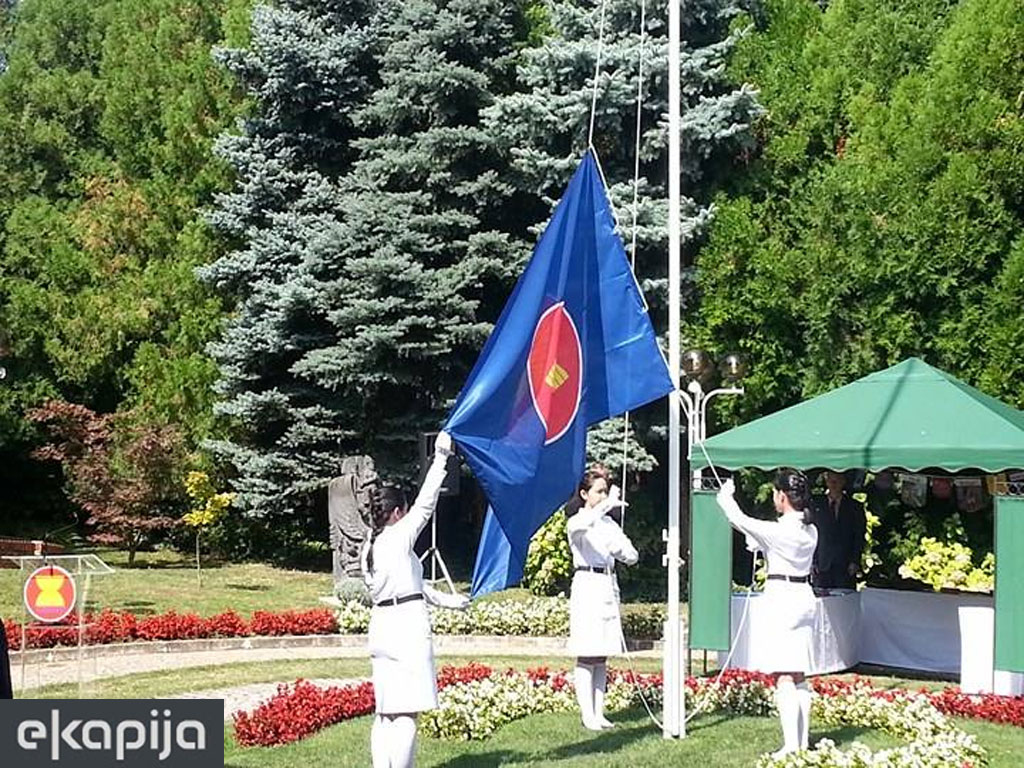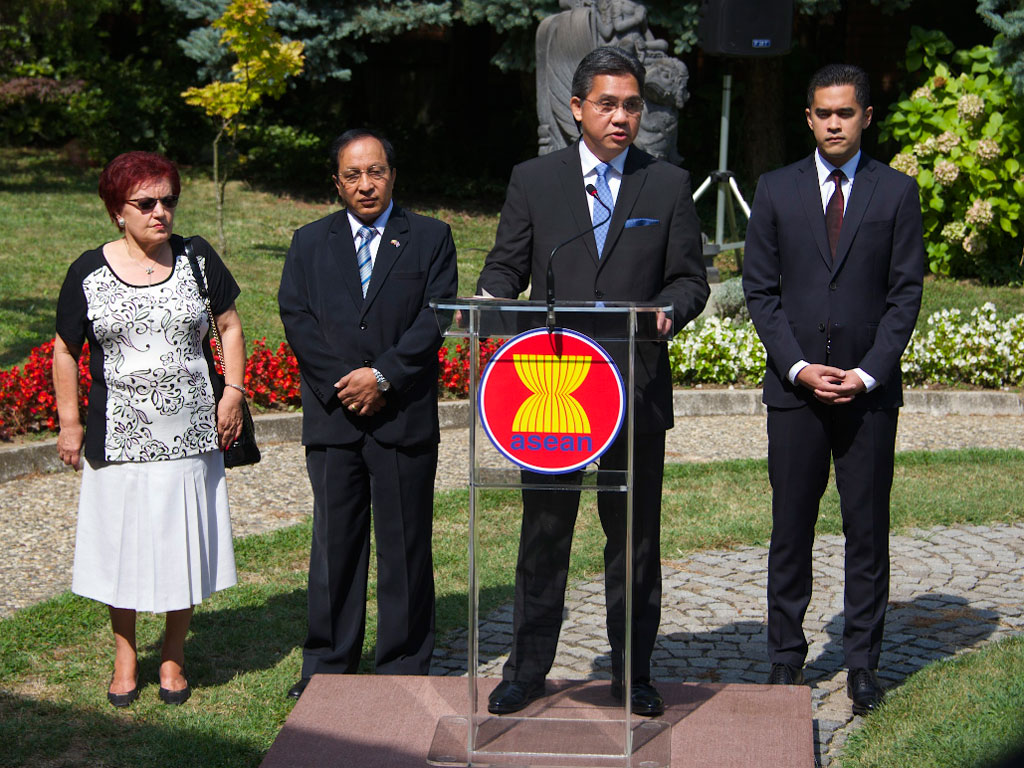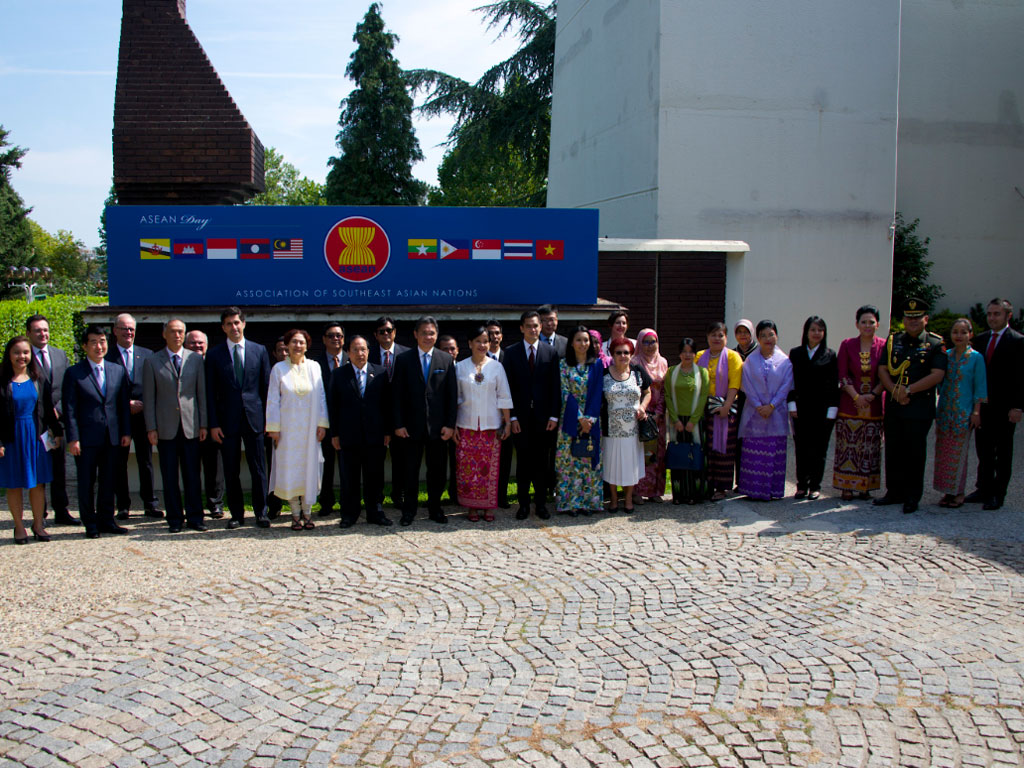ASEAN flag raised in Belgrade – Serbia not using good bilateral relations sufficiently
 Wednesday, 10.08.2016.
Wednesday, 10.08.2016.
 11:20
11:20

The Ceremony was co-hosted by the ASEAN Embassies based in Belgrade, Republic of Serbia, namely the Republic of Indonesia, the Republic of the Union of Myanmar and Malaysia.
ASEAN was established on August 8, 1967, in Bangkok, Thailand, with the signing of the ASEAN Declaration (Bangkok Declaration) by the ASEAN founding members, namely Indonesia, Malaysia, Philippines, Singapore and Thailand. Brunei Darussalam joined ASEAN on January 7, 1984, followed by Lao PDR and Myanmar on July 23, 1997, and Cambodia on April 30, 1999, making up what is today the ten Member States of ASEAN.
Since its establishment, ASEAN has been successful in facilitating the economic prosperity, political stability and security as well as socio-cultural cohesion of the countries in the South East Asian region.
The importance of ASEAN to the world economy is proven by the fact that they cover a market of over 622 million people. This potential market of ASEAN is larger than those of the European Union or North America, said the Ambassador of Indonesia in Belgrade, Harry Richard James Kandou.

The flag raising ceremony was attended by Heads of Missions and representatives from the Asia pacific embassies based in Belgrade and, on behalf of the Ministry of Foreign Affairs of Serbia, Goran Aleksic, assistant in charge of bilateral relations. Considering the fact that the Serbian delegation consisted of only one member, we wondered how well used the possibilities of cooperation between Serbia and the member states of ASEAN were.
Professor at the Faculty of Political Sciences and the director of the Asian Studies Institute, Dragana Mitrovic, reminds that Serbia's position as Yugoslavia's successor enables it to benefit from decades of bilateral cooperation with many of the ten member states of ASEAN, some of which are showing great interest in establishing a far more thorough economic cooperation in the areas of trade, tourism, direct investments in our economy, but also education, technological exchange etc.
– Since some of these countries are at the same time the most dynamic world economies and belong to the so-called growing or blooming economies, like Indonesia, Thailand, Vietnam, the economic cooperation with them could have a positive effect on the dynamic of the growth of our economy and the diversification of the market and sources of foreign investments – says prof. Dragana Mitrovic for eKapija and adds that, since the removal of sanctions, Myanmar too has become a hotspot of true competition between potential investors from the most developed economies.

Mitrovic believes that this is caused partly by our traditional weaknesses – the separation of science and the competent state institutions and the economy, which results in the lack of proper letters of recommendation, low interest of our business entities for markets outside Europe, the slowness of the existing institutions in realizing the initiatives from these countries, especially when it comes to interdepartmental cooperation, and the generally unfavorable climate in the Serbian economy and its weak capacities for competitive ventures in the world market.
J. Djelic
 ASEAN Jakarta
ASEAN Jakarta
 Ambasada Indonezije Beograd
Ambasada Indonezije Beograd
 Ambasada Malezije Beograd
Ambasada Malezije Beograd
 Fakultet politiÄŤkih Nauka FPN Beograd
Fakultet politiÄŤkih Nauka FPN Beograd
 Ministarstvo spoljnih poslova Republike Srbije
Ministarstvo spoljnih poslova Republike Srbije
 Institut za azijske studije Beograd
Institut za azijske studije Beograd
 Ambasada Republike Unije Mjanmar u Republici Srbiji Beograd
Ambasada Republike Unije Mjanmar u Republici Srbiji Beograd
Most Important News
06.04.2024. | Agriculture
Preconditions for Placement of Fresh Blueberries and Dried Plums in Chinese Market Secured

16.04.2024. | News
Jovan Ciric, Leasing Director Retail MPC Properties – MPC Echo symbolizes our desire for good ideas and innovative endeavors to spread freely and bring about positive changes

16.04.2024. | News
10.04.2024. | Finance, IT, Telecommunications, Tourism, Sports, Culture
Creative Industry – What This Serbian Economy Sector Worth EUR 2 Billion Encompasses

10.04.2024. | Finance, IT, Telecommunications, Tourism, Sports, Culture
24.04.2024. | Construction, Healthcare
Price of construction of Tirsova 2 increases to EUR 141.6 million – Contract awarded to consortium of 10 companies

24.04.2024. | Construction, Healthcare
16.04.2024. | News
Economy Fair in Mostar opens – 26 companies from Serbia exhibiting

16.04.2024. | News
24.04.2024. | Construction, Transport
Dates of publishing of tenders for construction of three sections of fast railroad from Belgrade to Nis known

24.04.2024. | Construction, Transport


 Izdanje Srbija
Izdanje Srbija Serbische Ausgabe
Serbische Ausgabe Izdanje BiH
Izdanje BiH Izdanje Crna Gora
Izdanje Crna Gora


 News
News






